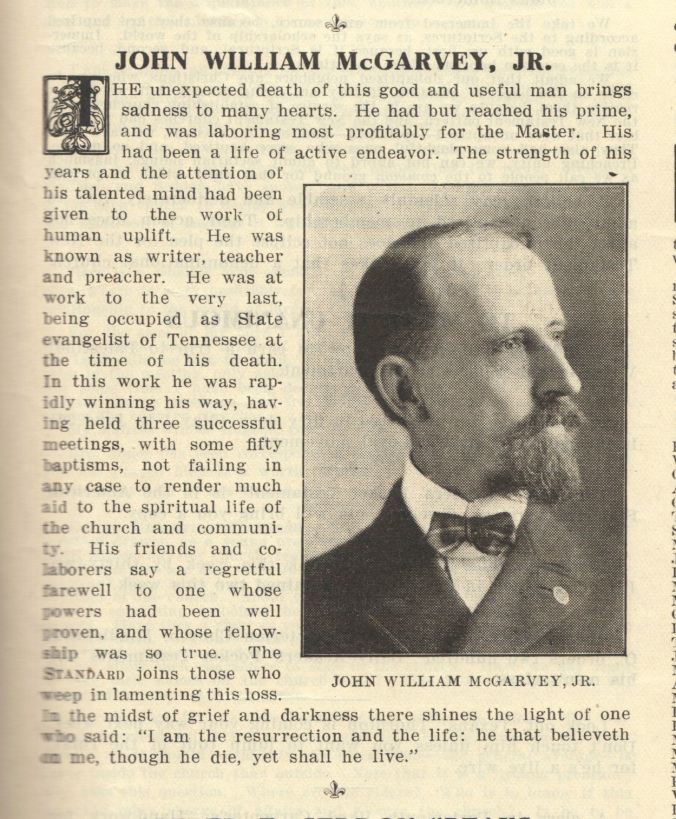[see part one here]
… after their business transaction was closed. No amount of business, no success, no adversity could cause him to forget God and the souls of men. The good he did is incalculable. Blessed is the memory of “Uncle Minor.”
I had not been long at Hopkinsville, teaching, before he wanted to make appointments for me in the country churches and schoolhouses round about. With some hesitancy and dread I consented, as I have always done, to the call to preach; and I was soon pretty busy with me teaching during the week and preaching on Sunday. At the end of five years’ work at Hopkinsville I was full of malaria. I fainted in the schoolroom, and had to be taken home in a carriage. So I left Hopkinsville and went back to Winchester, Ky., to get well. I was idle for several months, but was slowly getting well when Bro. John Adams of blessed memory, came for me to go with him back into the mountains to conduct a protracted meeting. I told him I had never conducted a protracted meeting; that it would be better for him to get some one else. But he said he could not get any one else, that I had been brought up in church and Sunday-school, that I had been to Bethany College, that I ought to be killed if I could not preach and that I was to shut my mouth and get my horse and come on with him. “Besides,” he said, “you know I can exhort like five hundred, and you come and preach the best you can, and I will exhort, and we will have a grand meeting. So I went with him; I doubt if I could have gone with a truer, bolder, kinder, better man. My eyes moistened with tears, and my heart is full of sweet, tender memories as I think of him. Sweet indeed to me is the memory of brave, strong, gentle, loving John Adams. I look forward, too, in hope to the day when he and I shall walk together the golden streets of the celestial city.
I went with Bro. John to each of his four preaching places that fall. We had five baptisms at the first place, five at the second, about seventeen at the third, and about twenty-seven at the fourth. Then I felt like I was man of not a little experience in evangelistic work, and was prepared to give points to the uninitiated. For four years my field of labor, for the most part, was the mountainous region of Eastern Kentucky. The people were very poor, the church houses were built of logs, and frequently lighted with tallow candles. They were poorly educated, if at all; but many of them were strong in native good sense and wisdom. Some of my most highly esteemed friends I found in those regions, and a number of them are there still. I know well, I have had goo opportunities to learn it, that a man is a man, whether in a mountaineer’s cabin or a brownstone front; and that a moral coward is just as likely to be found clothed in broadcloth; as in blue jeans.
After my father, the men of whom I am most indebted, I believe are Alexander Campbell, Benjamin Franklin, J. W. McGarvey and David Lipscomb. I have not named them in order in which I think they have been helpful to me, but in which I came under their influence. Campbell’s Christian Baptist, Franklin’s American Christian Review, McGarvey’s commentaries, in articles for the papers, Authorship of Deuteronomy and other writings, and Lipscomb’s editorials have furnished me the best reading I have found out of the Bible. I have used, of course, more or less, many of the great commentaries of ht sectarian world, but they have been of little value to me in comparison with the benefit I have received from the brethren just mentioned.
But the most valuable gift I ever received, I believe, was a little Bible my father gave me while I was yet a small child. It had pictures in it; and very plain and simple they were; not at all to be compared to the splendidly illustrated volumes of today. But those pictures were marvelous to me. My father trained me to turn the leaves without tearing them; and he and my mother would tell me the stories the pictures illustrated. For a long time that Bible was my chief treasure, and those stories my greatest delight. I was the first born in our house, and in course of time I showed the pictures and taught the stories to the other little ones. God only knows how much of blessedness that little book brought to be and to our house. I have made it a rule to have plenty of picture-books for my little ones, and their mother has given much time to telling them the stories. The sooner God’s truths are impressed upon the mind the better. He who is full of God’s truth, who delights in it, will preach. Not in public, may be, but he will preach; and his life will be a benediction to those who come under its influence. –James A. Harding.



